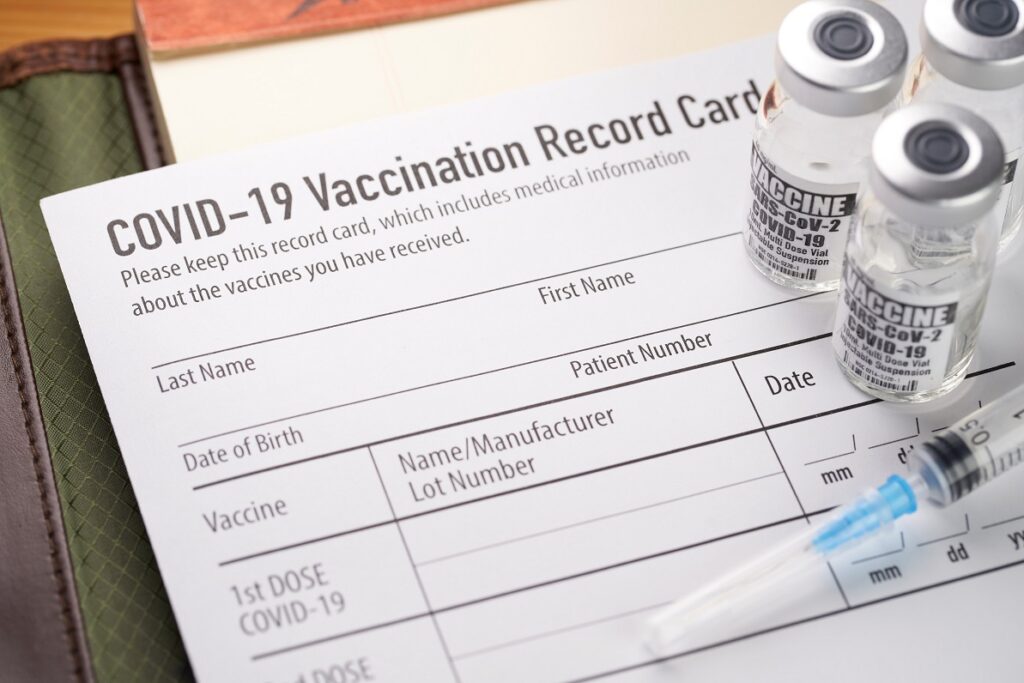
Federal Contractors and Companies Requiring Vaccinations
Recently, the Biden administration announced new measures to encourage vaccinations among Americans. Focusing primarily on increasing vaccinations at the federal level, President Biden stated that all federal government employees and on-site federal contractors are required to attest to their vaccination status. This order only applies to onsite contractors.
At this time, federal or contractor employees can refuse to attest to their vaccination status and still work if they are not yet vaccinated. However, there are implications to this choice. First, all unvaccinated/non-attesting employees and contractors will be required to wear masks while working on location, physically distance themselves while working, and test for COVID one to two times a week. Additionally, unvaccinated federal employees and contractors will be restricted from traveling for work.
As of now, federal contractors only need to attest to their vaccination status. President Biden has not ordered that on-site contractor employees receive the COVID vaccine. However, the stagnant vaccine rate, increasing infection numbers, and the severity of the Delta variant may lead this position to change.
If you are a federal contractor, it is important to ensure that all your workers are vaccinated or strictly follow CDC guidelines. These actions will not only protect your workforce, but they will allow you and your employees to avoid these additional burdens placed on unvaccinated employees. Further, there could be real contractual implications if a contractor employee violates CDC guidelines and causes a COVID outbreak.
Vaccination Trends: More Companies Are Considering Mandating (or Have Already Mandated) Vaccines as Delta Variant Spreads
Recently, employers have been showing more interest in required vaccinations. Despite initial ambiguity over the legality of an employer-imposed COVID-19 vaccine mandate in 2020, 2021 has brought a series of decisions and opinions from federal authorities and the judiciary clarifying that an employer vaccine mandate is legal as a condition of employment.
These court decisions and opinions could result in a potential increase of vaccine mandates enacted by private businesses in the wake of the new state and federal government regulations. As the coronavirus pandemic has tightened its grip on the U.S. yet again this summer, more employers are getting onboard with a workplace vaccine mandate.
In the private sector, companies including Morgan Stanley, Saks, Delta Air Lines, The Washington Post, United Airlines, and Facebook have all announced their own vaccine requirements for employees in recent weeks. Recently, Google announced it was delaying its return-to-office plans until October, and that employees must be vaccinated to go back in-person.
In terms of what’s legally allowed, employers do have the right to set the terms and conditions of employment. Employers can require employees be vaccinated against Covid-19, or to submit to mandatory Covid screenings. With that said, employers creating a vaccine requirement must be open to requests for reasonable accommodations as required by law, such as for workers who refuse for religious or medical reasons, including pregnancy. All such requests must be assessed individually, and employers have right to ask for supporting documentation
Vaccination Inquiries: Who Needs to Know?
Vaccination information is confidential medical information and can be disclosed only on a need-to-know basis. Considerations include:
- Company Policy determines who needs to know. For example, if fully vaccinated employees do not have to wear masks in the office, their direct supervisors might have a need-to-know vaccine status in order to enforce that policy.
- If an employer has mandated vaccinations and someone is not vaccinated because of an accommodation, that person’s supervisor would need to know this information so that the accommodations (which likely would involve social distancing and some wearing of masks in common areas) would be recognized and enforced.
Mask Guidance & Mandates by State
When it comes to requiring masking or not, it is apparent that things are very much in a state of flux. The Delta variant, CDC guidance, and ever-evolving state and local requirements will have significant impacts on all employers, including those that had recently dropped mask mandates for vaccinated individuals and those planning to reopen their worksites in the fall.
The Centers for Disease Control and Prevention (CDC’s) most updated guidance recommends that fully vaccinated persons in areas with substantial or high rates of COVID-19 transmission resume wearing masks in public indoor settings. The guidance also encourages all fully vaccinated persons who have a known exposure to COVID-19 to take a COVID-19 test three to five days after exposure, and to wear masks in public indoor settings for 14 days or until receiving a negative COVID-19 test.
Possible ‘Next Steps to Consider’ for Employers
At this time, employers may consider varying options to find the best way to implement appropriate safety measures for their businesses. As the CDC continues to advise that the risks of transmission are significantly increased among unvaccinated individuals, employers may want to consider implementing a vaccine mandate for employees working at their establishment, restricting entry only to fully vaccinated individuals, requiring the use of masks and Staying current on changing mask mandates for private employers, which vary by state. All these approaches have different pros and cons, and there is not a one-size-fits-all approach that will work for every employer. Considering current trends, we expect even more changes at state and local levels, and we encourage businesses to monitor these developments closely.
For more information or support on your vaccination policies please contact us today.
